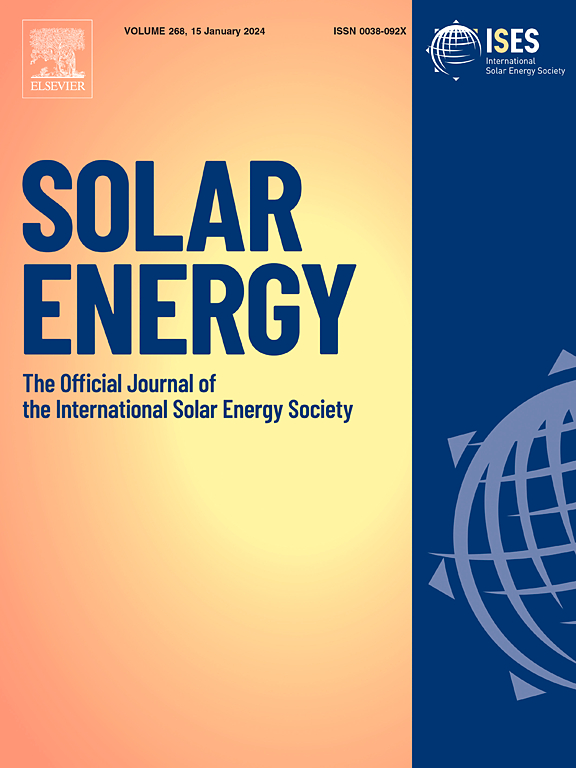Distribution and optimization of solar radiation in a solar greenhouse under the influence of wall shading
IF 6
2区 工程技术
Q2 ENERGY & FUELS
引用次数: 0
Abstract
In this study, an indoor solar radiation calculation model was established to investigate the horizontal beam and diffuse radiation distributions in a solar greenhouse and their optimization under the influence of wall shading. According to the model calculation results, both the indoor horizontal beam and diffuse radiation were influenced by greenhouse wall shading. The closer the location was to the corner, the lower the received global solar radiation on a horizontal surface. From 08:00 to 16:00 in winter, the position of the solar energy maximum on the greenhouse ground surface gradually moved from southwest to southeast. Then, the concept of the solar radiation utilization efficiency was proposed to explain the indoor horizontal solar radiation distribution differences between the span and length directions. Finally, the horizontal solar radiation variation was studied via dimensionless analysis of greenhouse building parameters. A sloped soil surface was proposed to improve global solar radiation received by the soil surface. On the basis of the dimensionless analysis results, when the length-height ratio was less than 4, ranged from 4 to 10, or greater than 10, there was an obvious shade effect, a weak shade effect, or a negligible shade effect, respectively. At soil slopes of 2.5°, 5°, 7.5°, and 10°, the hourly mean value of the total solar radiation on the soil surface from 08:00 to 16:00 increased by 6 %, 11 %, 15 %, and 20 %, respectively, compared with the original value.
墙体遮阳影响下日光温室的太阳辐射分布与优化
本研究建立了一个室内太阳辐射计算模型,以研究日光温室的水平辐射束和漫射辐射分布及其在墙体遮阳影响下的优化。根据模型计算结果,室内水平光束和漫射辐射都受到温室墙体遮阳的影响。位置越靠近墙角,水平面上接收到的全球太阳辐射就越低。从冬季的 8:00 到 16:00,温室地面上的太阳能最大值位置逐渐从西南向东南移动。然后,提出了太阳辐射利用效率的概念来解释室内水平太阳辐射在跨度和长度方向上的分布差异。最后,通过对温室建筑参数的无量纲分析,研究了水平太阳辐射的变化。提出了一种倾斜的土壤表面,以改善土壤表面接收到的全球太阳辐射。根据无量纲分析结果,当长高比小于 4、在 4 至 10 之间或大于 10 时,分别存在明显的遮阳效应、微弱的遮阳效应或可忽略不计的遮阳效应。当土壤坡度为 2.5°、5°、7.5° 和 10°时,8:00 至 16:00 土壤表面的太阳辐射总量的小时平均值分别比原始值增加了 6%、11%、15% 和 20%。
本文章由计算机程序翻译,如有差异,请以英文原文为准。
求助全文
约1分钟内获得全文
求助全文
来源期刊

Solar Energy
工程技术-能源与燃料
CiteScore
13.90
自引率
9.00%
发文量
0
审稿时长
47 days
期刊介绍:
Solar Energy welcomes manuscripts presenting information not previously published in journals on any aspect of solar energy research, development, application, measurement or policy. The term "solar energy" in this context includes the indirect uses such as wind energy and biomass
 求助内容:
求助内容: 应助结果提醒方式:
应助结果提醒方式:


